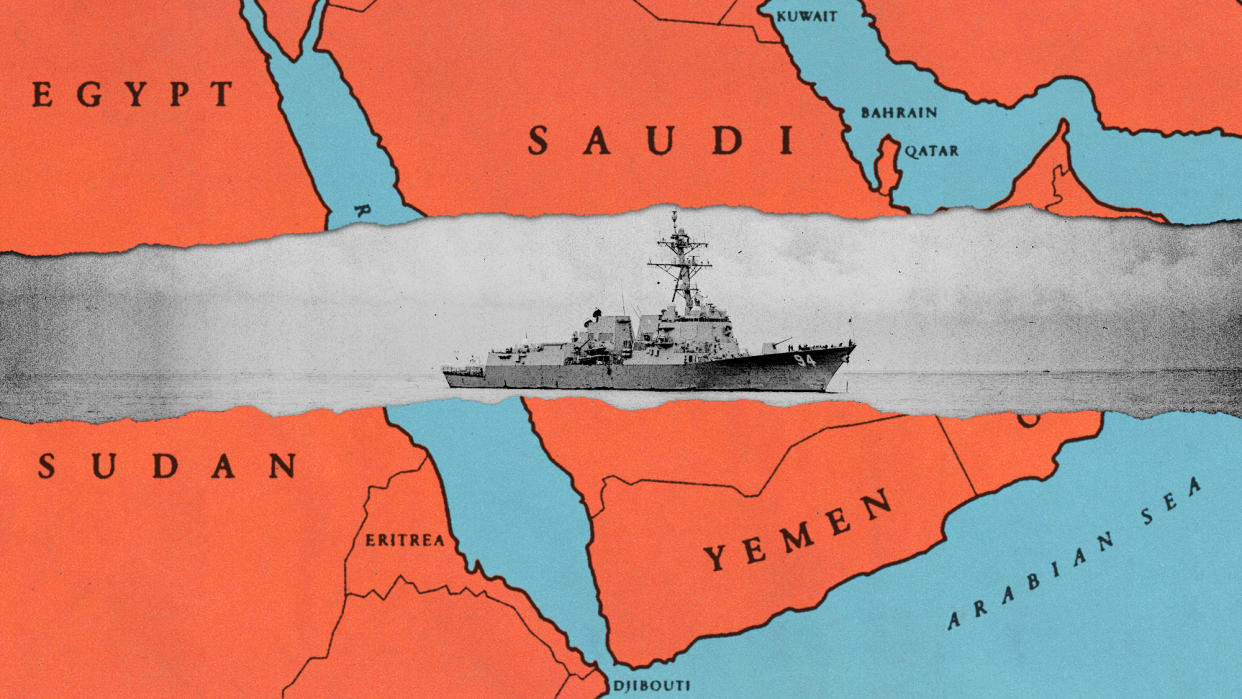Why won't the US retaliate against Houthi attacks?

There's a battle brewing in the Red Sea — but the U.S. is showing restraint for now.
Iranian-backed Houthi rebels based in Yemen launched missile attacks on three commercial ships in the Red Sea last weekend, The Associated Press reported, part of an escalation of regional violence since the outbreak of the Israel-Hamas war. American Navy ships "shot down an array of drones headed their way" as part of the action. So far, though, "the U.S. has avoided military retaliation."
Why? "There's high-level consensus" in the Biden administration that now is not the time to engage the Houthis, Politico reported. Officials still aren't clear that Navy ships were specifically targeted in the attacks. And Saudi Arabia, which has led fighting against the Houthis in Yemen, has urged U.S. leaders to show restraint. "What we don't want to see is the conflict in Israel widen to a regional war," a Pentagon spokesperson said this week.
That's a real danger. The Houthis have announced support for "their brothers in Gaza," the BBC reported, firing missiles at targets in Israel. Right now, "Washington will be reluctant to raise tensions any further in a region already nervous about spill-over from the war in Gaza." The Biden administration on Thursday morning announced new sanctions designed to disrupt Iran's support of the Houthis. Some critics want to see more direct retaliation. "We are not taking this seriously," said retired Vice Adm. John Miller, the former commander of U.S. 5th Fleet.
What the commentators said
"Enough is enough," think tanker Stephen Bryen wrote for Asia Times. The U.S. has done "very little" about Houthi attacks on Red Sea shipping. A successful attack could kill American sailors or blow up an oil tanker, "creating an environmental disaster." American ships have so far protected themselves and commercial ships from missile and drone attacks. Now it's time to take the next step. "Congress should demand retaliation and Biden should be forced to order it done."
The White House "wisely" wants to avoid a regional conflict, Frida Ghitis argued at CNN. But the Houthi attacks are part of a wider Iranian effort to harass Americans in the region — Teheran's proxy forces "attack American targets almost daily" in Syria. American officials should continue "calibrating its pushback carefully" but tougher steps are clearly needed. One of those steps: The U.S. should formally designate the Houthis a terrorist organization. "The continuing attacks, and the escalating threats to civil navigation cannot be allowed to stand."
"It seems that again Iran is the key," Zoran Kusovac offered at Al Jazeera. The Houthis aren't just launching missiles and drones at ships: They're also behind recent hijack attempts in the Red Sea. Retaliation is one option — but so is de-escalation. That works "only if all parties involved show restraint." Rather than continue on a path "to the point of no return," American leaders should do a little "quiet diplomacy to nudge Iran into reigning in its proxy and avoiding new hijackings at sea."
What next?
Biden administration officials are trying to see the big picture: Too aggressive a response to the Houthis could "imperil not just the Yemen peace process, but the wider Iran-Saudi Arabia rapprochement," a "senior Western official" told Middle East Eye. The problem? The rebels seem to have factored that into their own decision-making. "The Houthis have worked out they can pretty much do whatever they want and not face consequences," said Michael Knights of The Washington Institute for Near East Policy.
That's not to say the White House isn't taking any action. The New York Times reported that American officials are in talks with other countries to create a naval task force to protect shipping in the region. "That would be a natural part of the comprehensive response to what we're seeing," Jake Sullivan, the national security adviser, said this week. The pressure is clearly on, however. Sen. Lindsey Graham (R-S.C.) urged military action against the Houthis' sponsors. "We need to regain deterrence," he said, "by letting Iran know its infrastructure is on the target list."

